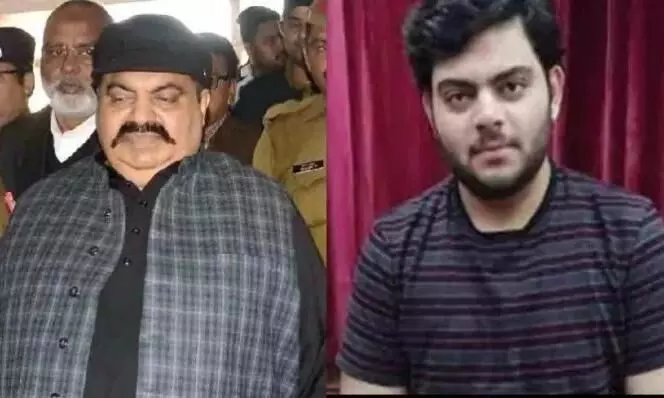
Atiq’s killing not pre-planned, UP Police ‘encountered’ his sons for self-defence: Judicial Panel
text_fieldsA two-member judicial commission has exonerated the Uttar Pradesh Police in a series of high-profile incidents involving the deaths of four men, including Atiq Ahmed's sons, amid accusations of extrajudicial killings by critics.
The commission, led by Rajiv Lochan Mehrotra, a retired judge of the Allahabad High Court, and Vijay Kumar Gupta, a former Director General of Police, UP, conducted a thorough investigation into the circumstances surrounding the deaths. The incidents in question occurred in early 2023, following the murder of Krishna Kumar Pal, a key witness in a significant political case, The Wire reported.
The commission's report, tabled in the state Assembly on August 1, affirmed that the three separate "encounters" involving the Uttar Pradesh Police were indeed genuine and justified. The encounters took place in Prayagraj and Jhansi over a span of a few months and were connected to the broader investigation into the murder of Umesh Pal, a lawyer and district panchayat member.
According to the commission, the encounters, which resulted in the deaths of accused individuals Arbaaz, Vijay Kumar Chaudhary alias Usman, Mohammad Asad Khan, and Mohammad Ghulam, were carried out in self-defence. The panel’s findings were based on medical examinations, forensic reports, and the evidence presented by forensic scientists, which supported the police’s claim of acting in self-defence.
The investigation concluded that the police had not engaged in any conspiracy or malice. The forensic evidence demonstrated that the injuries sustained by the deceased were consistent with having been shot from a distance, and the weapons recovered from the deceased were linked to the crimes they were accused of.
The medical reports also claimed to corroborate that the injuries suffered by the policemen were not self-inflicted but caused by firearms.
The judicial commission also reviewed the incidents in the context of the broader narrative surrounding the police’s actions, The Wire report suggested.
The encounters occurred in the wake of a violent attack on Umesh Pal and his security detail on February 24, 2023, which had significantly heightened tensions and scrutiny surrounding law enforcement’s approach to tackling organized crime in the region.
The first encounter happened on February 27, 2023, when Arbaaz was shot in Prayagraj. This was followed by another shooting on March 6, 2023, where Usman was killed in the same city. The third encounter occurred on April 13, 2023, in Jhansi, resulting in the deaths of Asad Khan, Atiq’s son, and Mohammad Ghulam. The police claimed that each of these incidents involved the accused firing first, prompting retaliatory action.
In a separate investigation, a five-member commission led by former Allahabad High Court Chief Justice Dilip Babasaheb Bhonsle reviewed the double murder of Atiq Ahmed and his brother Ashraf on April 15, 2023.
The commission found no evidence of a pre-planned conspiracy involving state officials or police officers. The report indicated that the murder of Atiq and Ashraf was an unexpected event that the authorities could not have prevented.
The killings of Atiq and Ashraf, who were high-profile figures with a contentious political history, had been a significant blow to the Uttar Pradesh government's claims of maintaining law and order. The government, led by Chief Minister Yogi Adityanath, had previously vowed to dismantle what he termed a "mafia" network, which included Atiq Ahmed. The state had aggressively acted against Atiq’s associates and seized assets worth hundreds of crores.





